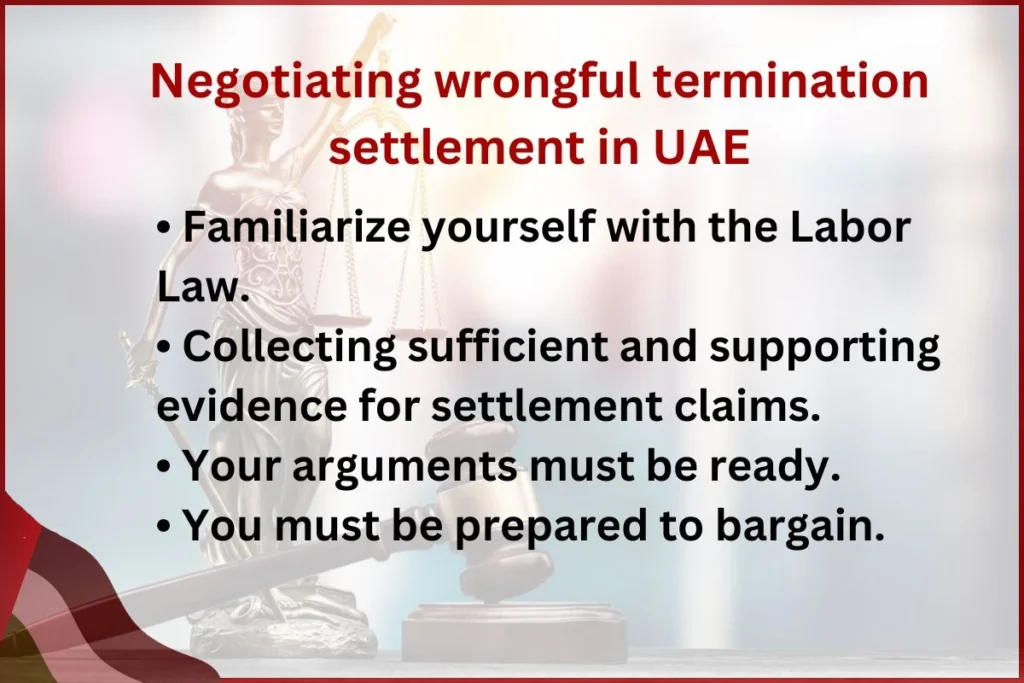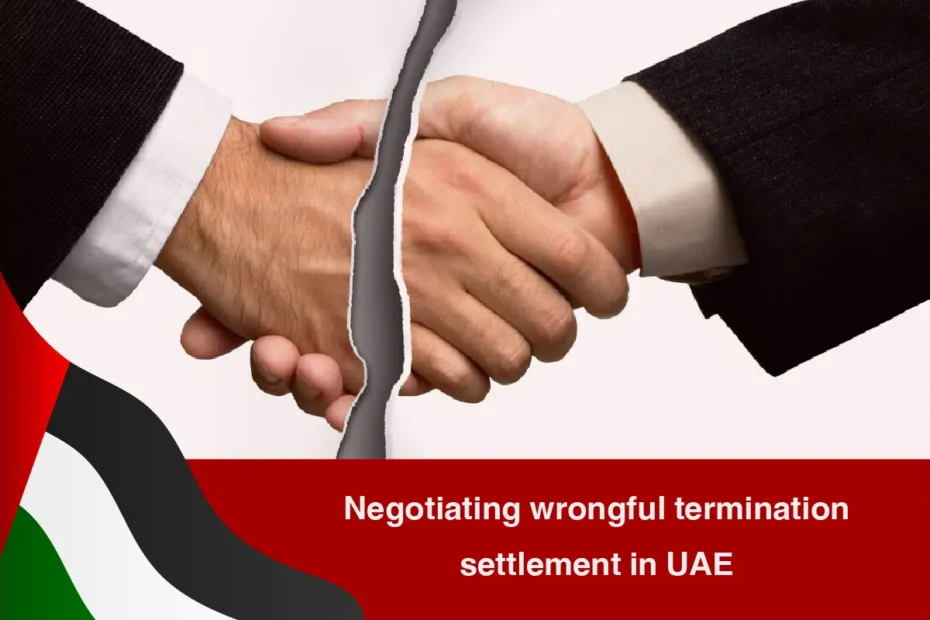Negotiating wrongful termination settlement in UAE is an amicable way of using dialogue to resolve the issue of unfair dismissal of an employee.
This article will discuss important legal tips to negotiate a wrongful termination fair settlement.
Office of Al Mulla. Whatsapp: Click here. Location: Dubai. Phone: 00971501961291.
Table of Contents
Negotiating wrongful termination settlement in UAE.

As an employee who faced a wrongful termination case and wants a fair settlement without going to the courts, negotiation is your best choice to get your rights and save the relations with your boss.
Here are some tips before entering into negotiations:
- You must fully know your legal rights and familiarize yourself with the Labor Law.
- Collecting sufficient and supporting evidence for settlement claims.
- Your arguments must be ready, so work out different scenarios for the negotiation process in advance.
- You must be prepared to bargain.
For negotiations to be effective, some necessary techniques must be available when negotiating to obtain a settlement, as follows:
- Legal knowledge. The person who wants the settlement process must have experience and familiarity with the various laws and regulations to use them appropriately and in a simplified manner to reach a just and amicable settlement.
- Negotiation and persuasion skills. It is the essential technique that a settlement mediator must possess because the primary goal of negotiation is to tactfully convince one or both parties of the possible solutions in a way that all parties understand.
- Patience and wisdom. This talent lets the mediator absorb everything the parties put forward and work to correct their mistakes smoothly and streamline.
Amicable settlements are an inevitable result of any dialogue process supported by negotiation skills and persuasion.
This requires the presence of a qualified and experienced person in settlement negotiations with the qualities we mentioned earlier, such as Al Mulla Labour Lawyer & Legal Consultant who is skilled in labour cases.
Settlement amount factors.
When negotiating a wrongful termination settlement in UAE, the employer is responsible for all the due amounts for an employee who faced a wrongful termination case.
The final settlement calculation comprises the computation of all obligations that must pay such as:
- End-of-service gratuity.
- Notice period pay.
- Any unutilized leave.
- Any compensation or benefits mentioned in the employment contract.
In general, settlement amounts are determined based on the following:
- Type of contract.
- The number of years served in the work.
- Reason for termination.
- Basic salary.
In wrongful termination cases, settlement amounts depend on the following:
- The compensations which calculated based on the type of work, the amount of damage to the employee, and the time of service.
- End-of-service allowance.
- Warning allowance.
- Any unpaid dues from the employer.
In wrongful termination of employment, the compensation amount shall not exceed the worker’s wage for three months calculated based on the last salary to which he was entitled.
FAQs about negotiating a wrongful termination settlement.
In conclusion, we have provided you with valid and valuable legal information about negotiating wrongful termination settlement in UAE and the requirements for fair compensation.
Suppose you want to solve your labour problem and reach the correct legal solution. In that case, the Al Mulla Lawyer’s Office is always ready with its high negotiating experience to help you, do not hesitate to contact us.
Contact the office of Al Mulla via Whatsapp. Click here. Or visit us at our law firms: Dubai. You can also call us on phone: 00971501961291.
We recommend you read about how to sue a company for Wrongful Termination in UAE Dubai, the New UAE labour law on termination of contract and Termination of employment entitlements in UAE Dubai 2023.
A legal consultant specializing in UAE labor law. He regularly publishes articles on the website and writes on various areas of UAE law, with a specific focus on labor law.
